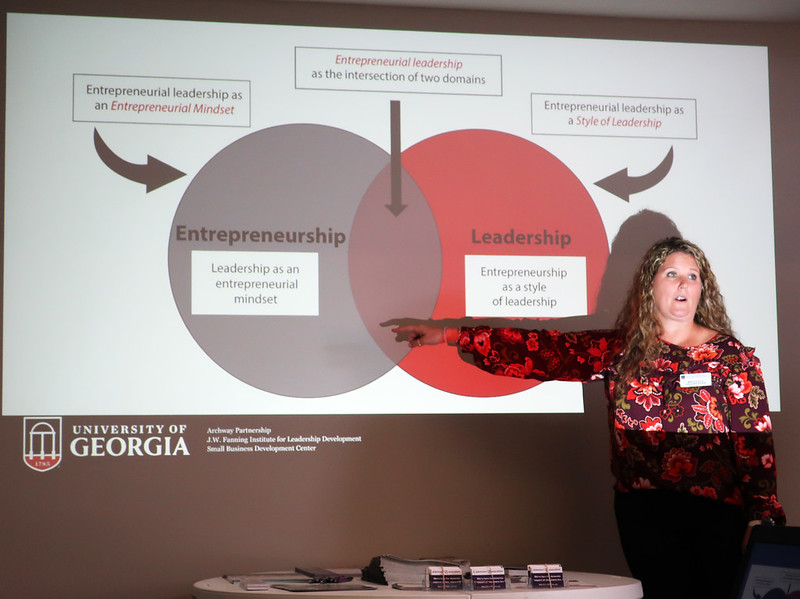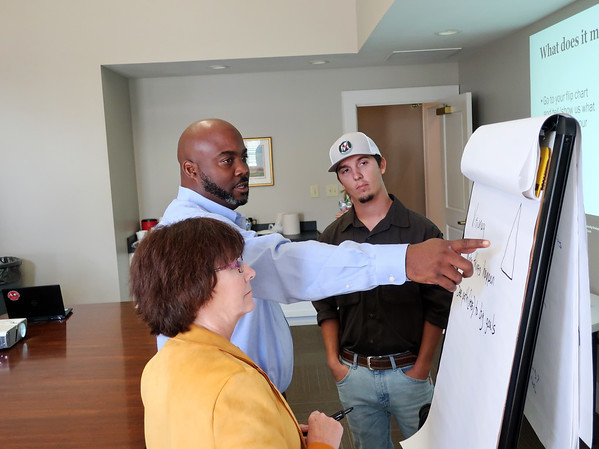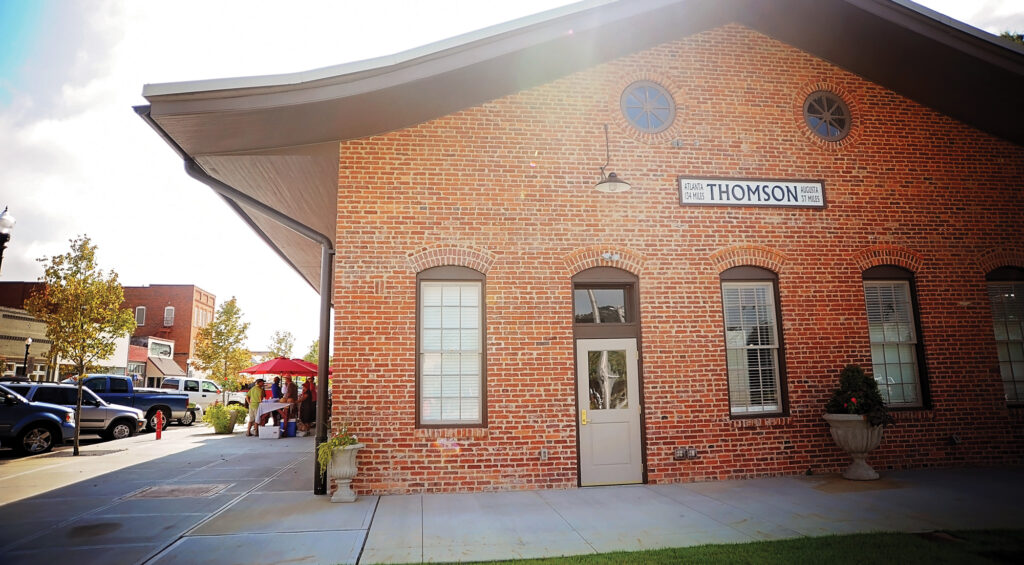From downtown redevelopment and beautification to recreation and tourism, an East Georgia community is tapping into University of Georgia expertise to increase opportunities for economic development and help grow local business.
Thomson, a UGA Archway Partnership community and the first to earn UGA’s Connected Resilient Community designation, recently launched a program designed to help entrepreneurs develop business and leadership skills.
The inaugural Thomson-McDuffie Entrepreneurial Leadership Academy includes nine entrepreneurs. Experts from two UGA Public Service and Outreach units—the J.W. Fanning Institute for Leadership Development and the Small Business Development Center—will lead the program.

Brittany Adams-Pope, a public service faculty member in the Fanning Institute, leads the first session of the Entrepreneurial Leadership program in Thomson. (Submitted photo)
The academy was developed by Forward McDuffie through the Fanning Institute’s Innovations in Community Leadership Initiative (ICLI), which provides resources and training for communities and organizations across Georgia that aspire to develop or revamp leadership programming. Forward McDuffie is an organization that includes city mayors and county commissioners, the industrial development authority, the downtown development authority, the chamber of commerce and the convention and visitor’s bureau.
“We want to create a pipeline where people who have good ideas can bring them to fruition and grow them right here in our community,” said Don Powers, president and CEO of Forward McDuffie and chairman of the Thomson-McDuffie Archway Partnership Executive Committee.
Between now and spring 2023, Fanning Institute faculty will help participants enhance their skills as business leaders by communicating, collaborating and managing conflict more effectively and understanding how to maximize their leadership skills and the skills of those around them.
Meanwhile, consultants from the Augusta SBDC office will work with participants on the technical aspects of developing their business.
“I am overjoyed that Thomson is offering something like this and excited that I am part of it,” said Kenya Calhoun, who is starting an event planning business. “After just the first session, I am gaining knowledge that will help set myself and my business up for success.”
During the first session, participants learned how they think and operate as a leader and how to apply that to starting and operating their businesses. They also learned how to develop a business plan that establishes a foundation for their business.
“I have already learned a lot about myself and my personality in relation to being a business owner and learned a lot of information about running a business that I did not know before but need to know,” said Freddie Gavin, who is opening a multimedia and music studio business in downtown Thomson. “I am excited about what I learned today and looking forward to the rest of the program.”
The program also provides an opportunity for entrepreneurs to connect with each other and with the community.
“We can do a lot more in business and in our community together than we can separately,” said Calhoun. “My business in particular will rely on building partnerships and collaborations and this is a great opportunity to build relationships with like-minded people, support each other and grow together as entrepreneurs.”
Creating that connection is another central focus of the program, Powers said.
“Sometimes, entrepreneurs do not get connected into traditional leadership programming,” he said. “This program gives them an opportunity to get involved and find more opportunities to engage with the greater community. That can help their business and also help McDuffie County identify the next generation of leaders.”
Through this initiative, Forward McDuffie has created a unique opportunity for local entrepreneurs, said Brittany Adams-Pope, Fanning Institute public service faculty member.
“Combining leadership skills with technical business skills creates well-rounded business owners ready to not just run a business, but lead it,” Adams-Pope said.
Understanding technical skills needed to launch a business is critical, said Rick McMurtrey, area director for the Augusta SBDC office.
“Our goal is helping them think through the startup process to make informed decisions about their business ideas and put them in the best position for success,” McMurtrey said.
“Our partnership with UGA and Public Service and Outreach has been key to helping us address the challenges our community faces and invest in our future by generating opportunities and developing the next generation of leaders,” Powers said. “We are proud of the relationship we have with the university.”
For more information on the Connected Resilient Communities initiative, click here. To learn more about the Innovations in Community Leadership Initiative, click here.

